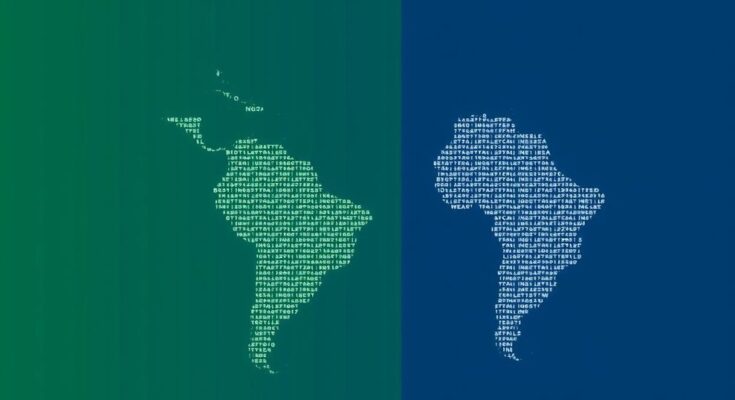This article examines the economic crises faced by Bolivia and Venezuela, highlighting their reliance on natural resources and the consequences of political instability. Both nations exemplify the risks of over-dependence on hydrocarbon exports. Bolivia is experiencing a significant decline in natural gas production, while Venezuela suffers from an extreme economic collapse due to oil dependency and sanctions. Lessons learned from these crises are essential for building more resilient economies in South America.
South America, a continent rich in natural resources, is currently facing significant economic crises that underscore the fragility of its political and economic systems. Bolivia and Venezuela exemplify the vulnerabilities of economies heavily reliant on resource exports. While both nations are experiencing unique challenges, their crises stem from similar roots, including economic mismanagement, dependence on resources, and political instability.
Bolivia, once celebrated for its successful resource-led development, now confronts a sharp decline in natural gas production. The country’s revenue, which heavily relied on natural gas exports, has deteriorated substantially due to underinvestment in vital sectors. By 2023, natural gas exports had decreased by nearly 40 percent from their all-time high, jeopardizing Bolivia’s trade balance and depleting its foreign reserves. The economic situation is aggravated by political discord, as President Luis Arce grapples with internal conflicts and rising inflation, which have led to social unrest and diminished public trust in the government.
In contrast, Venezuela’s economic downturn is one of the most severe in the region. Although it possesses the largest proven oil reserves globally, Venezuela’s over-dependence on oil exports, compounded by rampant corruption and mismanagement, has crippled its economy. The collapse of oil prices in 2014 marked the onset of economic decline, further exacerbated by international sanctions imposed on the Maduro regime. Hyperinflation, peaking at a staggering 1,700,000 percent in 2018, has devastated the population’s purchasing power, resulting in widespread shortages of essential goods and medicines. Furthermore, the authoritative government of Nicolás Maduro has suppressed dissent without addressing the underlying economic issues, perpetuating stagnation and authoritarian rule.
The commonalities between Bolivia and Venezuela’s crises reflect the risks associated with resource dependency. Both countries heavily relied on hydrocarbon exports—natural gas in Bolivia and oil in Venezuela—to fuel their economies. When global prices fell, their revenue sources dwindled, laying bare the structural inadequacies. The lack of economic diversification rendered both nations susceptible to external economic shocks.
Political instability has aggravated the economic landscapes in both countries. In Bolivia, the conflict between President Arce and former President Morales has hindered governance, while Maduro’s autocratic leadership in Venezuela has alienated potential international partners, deepening economic isolation. Public resources have been mismanaged, leading to corruption that has eroded trust in governmental institutions across the board.
Nevertheless, Bolivia and Venezuela adopt differing approaches to their respective crises. Bolivia’s Arce administration has attempted to stabilize the economy by courting foreign investment and diversifying exports; yet, political infighting hampers these efforts. Conversely, the Maduro regime has predominantly relied on authoritarian tactics to maintain control, using measures that stifle dissent and limit access to vital resources. While the Venezuelan government has sought to bolster ties with nations such as China, Iran, and Russia, these strategies provide only a temporary reprieve from deeper systemic issues.
The ongoing crises in Bolivia and Venezuela impart valuable lessons for other South American nations. They serve as cautionary tales about the dangers of resource dependence and political mismanagement. The imperative for substantial reforms—both economically and politically—stands clear for the sustainability of the continent’s economies. As South America navigates its future, the strategic decisions made today will significantly influence whether the region can progress or continue to endure cycles of fragility and unrest.
South America is characterized by its vast natural resources, contributing significantly to the economy of various nations. However, several countries on the continent are currently grappling with economic crises rooted in excessive reliance on these resources, primarily hydrocarbons. Specifically, Bolivia and Venezuela, while distinct in their socio-political contexts, share alarming similarities in the ways their economies have been compromised due to political turbulence, poor governance, and a lack of economic diversification. Their experiences offer critical insights applicable to the broader South American context as nations work to build sustainable economic frameworks.
In summary, the ongoing economic crises in Bolivia and Venezuela reveal the intrinsic dangers associated with resource dependency and political instability. Their shared experiences highlight the urgent need for comprehensive economic and political reforms to fortify economies across South America. The lessons drawn from these crises underscore that the choices made today in governance and economic policy will be pivotal in determining the future resilience and prosperity of the continent.
Original Source: www.firstpost.com




